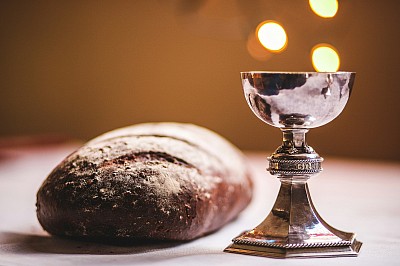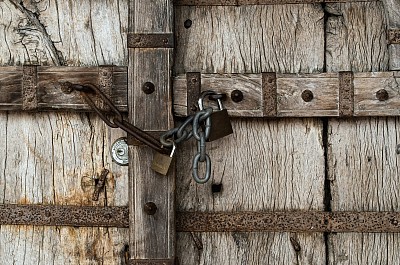Blogs
The Lion That Will Not Purr
If there is one thing our age has mastered, it is the art of being politely wrong. We live in a world that would rather have a comfortable lie than a disturbing truth. It asks not, “Is it real?” but rather, “Will it keep things quiet?” And yet every Christian ought to know by now that peace without truth is not peace at all, only the calm of a cemetery. The gospel of Christ was never meant to be diluted into something mild and non-threatening. It was meant to strike like lightning.
Think of that once-blind man in John’s Gospel. He is dragged before a panel of experts, men who could quote entire scrolls but could not recognize the God who wrote them. They demand explanations. They expect a debate. But he gives them something far more dangerous: a testimony. “One thing I know, that, whereas I was blind, now I see” (John 9:25). No fancy speech, no philosophical fencing. Just a simple, unshakable fact. And facts, when lit by the fire of heaven, can shake empires.
The modern critic arrives in much the same spirit as those Pharisees: armed with clever arguments, long vocabulary, and the confidence of one who believes that truth is fragile enough to dissect on a classroom table. They imagine the Christian faith as some museum artifact—dead, dusty, and defenseless. But the Word of God is not an artifact. It is, and has ever been, a Lion. You do not tame a Lion with theories, nor silence its roar with your footnotes. “For ever, O LORD, thy word is settled in heaven” (Psalm 119:89). You might as well try to vote the sun out of the sky.
Let no one tell you that you need to be brilliant to stand firm. What you need is not a library of arguments but a collision with the living God. One moment of true repentance, one touch of His redeeming hand, will furnish you with more authority than a thousand textbooks. Say it plainly, even if your voice trembles: “I was lost... blind, wandering, hopeless. But He found me. He brought me up also out of an horrible pit, out of the miry clay, and set my feet upon a rock” (Psalm 40:2). The gospel is not a theory you politely admire from afar. It is power, real power, “the power of God unto salvation to every one that believeth” (Romans 1:16). And true power does not tiptoe. It announces itself.
A man who has met Christ is not easily argued out of it. You may shake his mind with clever reasoning, but his soul has seen too much to retreat. The grace that raised him from death is not a rumor but a reality. The world may snicker. It may stroke its intellectual beard. But it cannot dismiss a walking miracle. “If any man be in Christ, he is a new creature: old things are passed away; behold, all things are become new” (2 Corinthians 5:17). What classroom theory can explain a resurrected heart?
Therefore, dear believer, stand straight. Do not dress truth in polite clothing to impress a generation that is dying of politeness. Do not file down the sharp edges of the cross to make it more acceptable. Preach it as it thunders. Live it as it burns. Let your very existence become a loud and inconvenient reminder that Christ is alive. We are not called to negotiate with darkness. We are called to wage war with light. “Earnestly contend for the faith which was once delivered unto the saints” (Jude 1:3).
Let the world debate. Let hell shout. We shall testify. And the roar of a soul redeemed by the blood of the Lamb will drown them all.
The Garden Behind the Door
If you have ever watched a child at play, you may have noticed something curious. Give him a stick and he will imagine it into a sword; give him a box and it becomes a castle. Children are, in a way, small magicians. But the greatest magic of all is not what they hold in their hands. It’s what they carry in their hearts. And a child’s heart, like any garden, is always growing something.
The apostle Paul puts it plainly: “Whatsoever a man soweth, that shall he also reap” (Galatians 6:7). You cannot plant thorns and expect roses. Nor can you plant nothing at all and expect order. Fields left alone never become gardens. They become jungles. And so it is with the soul, especially the soul of the young. The younger the soil, the quicker it takes the seed, whether for good or for evil.
Scripture tells us, “Train up a child in the way he should go: and when he is old, he will not depart from it” (Proverbs 22:6). That is not a polite suggestion. It is a command with the weight of eternity hanging on its shoulders. Parents are not only cooks and drivers and bill-payers. They are gardeners of immortal creatures. The home is the first school of virtue, the first chapel of worship, and the first workshop where character is hammered, shaped, and tested.
Now, someone may say, “But I already bring my children to church.” Good. Keep doing that. But do not forget this: your child watches you far more closely than he listens to the preacher. Your actions preach seven days a week. Your prayers, or the lack of them, speak in a voice louder than any sermon. Your love for Scripture—or your quiet neglect of it—drops seeds into the soil of your child’s heart every single day.
A garden left untended does not stay empty. It fills itself with weeds. And weeds never wait for permission. That is why Paul warns, “Fathers, provoke not your children to wrath: but bring them up in the nurture and admonition of the Lord” (Ephesians 6:4). Somehow, in God’s mysterious design, He has trusted ordinary parents with the extraordinary task of forming eternal souls. This is a calling so great that to ignore it is not simply careless. It is dangerous.
For make no mistake: if you will not sow, the world will. It will scatter seeds of rebellion, pride, and unbelief with generous hands. And when your child grows older and you see bitter fruit, you may wonder why. But by then the answer may already be rooted deep within them. Scripture speaks a terrifying word for such wasted seasons: “The harvest is past, the summer is ended, and we are not saved” (Jeremiah 8:20). Who can hear such a cry from their own grown child and not tremble?
Parents, let me speak plainly. To neglect the spiritual training of your children is not a small mistake. It is a kind of spiritual treason. There is no middle ground. You are either helping your child walk toward Christ, or you are leaving them exposed to the pull of the world. Every day you are sowing something. The only question is: what?
But let us not end in despair. Tears are good, but labor is better. Let us pray with our children, open the Scriptures with them, model forgiveness before them, and show them what it looks like when Christ rules a human heart. Let us prepare their soil with patience and love so that when the Good Seed is planted, it may take deep root and bear fruit that lasts.
For the promise remains shining and strong: “He that soweth to the Spirit shall of the Spirit reap life everlasting” (Galatians 6:8).
May God help every parent to sow wisely, faithfully, and with hope. For the garden behind the door, the heart of a child, is too precious to neglect.
A Table Too Holy for Careless Feet
There are some things in life so weighty that one feels almost foolish trying to explain them, like telling a child why the sea is deep or why fire burns. The Lord’s Table is one of those things. It is simple enough for a new believer to touch, and yet so sacred that even the oldest saints approach it with trembling hearts.
Today, however, we seem to treat this holy table as casually as one treats a familiar bench in the town plaza. We slide into our seats, whisper a few words, take the bread, take the cup... and walk out as if nothing eternal had happened. One could almost imagine an angel watching us and asking, “Have they forgotten where they are?” For this table is no polite church ceremony. It is an appointment with the Crucified One, who “bare our sins in His own body on the tree” (1 Peter 2:24).
The Lord’s Supper is not a badge of religious respectability. It is certainly not a habit, like brushing your teeth or showing up to class because attendance is required. It is a remembrance of the darkest and brightest moment in history: the death of the Son of God. The Lamb of God carried the shame of all humanity—my sin and yours—until it crushed Him. And here we are, touching symbols of that sacrifice. How can we do so without trembling?
Paul, in his blunt and fatherly way, tells us, “Examine yourselves, whether ye be in the faith” (2 Corinthians 13:5). It is as if he is saying, Do not stroll into this mystery as if you were entering a shopping mall. Check your heart first. Make sure you are awake to the weight of what you are remembering.
Yet many of us come with hearts untouched: unrepentant, unchanged, and unbothered. This is a kind of madness. For we stand before the memory of the One who “was wounded for our transgressions… bruised for our iniquities” (Isaiah 53:5). When we take the bread and the cup, we announce to the universe that Christ died, and that we depend on that death for our life. Such an announcement demands gravity, sincerity, and yes, even a kind of holy fear.
If we come only because “everyone else is coming,” or because we think God will be somehow impressed by our attendance, then we come unworthily. And unworthy coming is no small matter. Paul warns us soberly: “He that eateth and drinketh unworthily, eateth and drinketh damnation to himself, not discerning the Lord’s body” (1 Corinthians 11:29). The warning is sharp because the love behind the table is fierce.
Before approaching this ordinance again, let us kneel. Perhaps literally, but certainly spiritually. Let every mask fall. Let every excuse break. Let every sin be confessed plainly before the Lord who already knows it. Come because your heart aches for His mercy, because your soul is thirsty for His cleansing. Come as a beggar to a King, as a wounded man to a Healer, as a sinner to a Savior.
For this table is both a grave and a doorway: death to our pride, life to our souls. It is a place where judgment and mercy meet, where sin is exposed and grace is poured out. Approach it lightly, and you miss its wonder. Approach it broken, and you will find its sweetness.
And when you rise from that holy place—humbled, forgiven, made clean—you will find yourself echoing the ancient shout of victory: “Thanks be to God, which giveth us the victory through our Lord Jesus Christ” (1 Corinthians 15:57).
May we never come to this table casually again. May we always come... small, trembling, and entirely grateful.
The All-Seeing Eye of God
How often we forget that the Lord’s eyes are never dim, His gaze never distracted. “The eyes of the Lord are in every place, beholding the evil and the good” (Proverbs 15:3). There is not a moment, a step, or a breath that escapes His perfect knowledge. He sees all: the grand and the small, the victories and the struggles, the seen and the unseen. And what unspeakable comfort that brings to the one who loves Him!
Jesus knows the path you tread even now, and He knows where you will stand tomorrow, ten years from now, and at the end of your days. “Known unto God are all his works from the beginning of the world” (Acts 15:18). Not only does He see the road ahead, but He ordains your every step. There is no accidental meeting, no unplanned visitor. Whether you venture out into the world or sit quietly at home, His purposes unfold with divine precision. For the one who walks in His will, even the unexpected is part of a larger plan.
“We know that all things work together for good to them that love God, to them who are the called according to his purpose” (Romans 8:28). Ah, the marvel of it!
It is not that all things are good, but that the Lord, in His sovereign love, takes every joy, every sorrow, every trial, and uses them all to serve our ultimate good.
What we cannot see, He has already accounted for. What confounds us, He understands completely. His knowledge is not a cold, detached omniscience, but a deeply involved, compassionate foreknowing.
Yet, let us not mistake this knowledge for mere divine oversight! He does not only observe. He orchestrates. The hands of our Lord are as active as His eyes. “For I know the thoughts that I think toward you, saith the Lord, thoughts of peace, and not of evil, to give you an expected end” (Jeremiah 29:11). His will, beloved, is to bring you safely to that “expected end,” where all will be made clear, and every trial will seem but a momentary affliction compared to the glory that awaits (2 Corinthians 4:17).
So, dear soul, cast off your anxieties. Do not fret over tomorrow’s uncertainties, for they are certain to the One who holds them. Do not fear the unexpected, for it is expected by Him who has written the story of your life. Rest in the truth that the Shepherd of your soul knows your way, and every step you take is within the bounds of His all-knowing care. The One who has called you will keep you, and His eyes will never look away.
Freedom
What unspeakable joy it is to be free! Not merely free from chains of iron, but free from the deadliest shackles of all: sin, death, and the burden of a guilty conscience. For too long, many of us were slaves to sin, “sold under sin” (Romans 7:14), walking in darkness, bound by the cords of our own rebellion. But praise be to God, who has delivered us by the precious blood of His Son! “If the Son therefore shall make you free, ye shall be free indeed” (John 8:36).
To be truly free is to stand as a redeemed child before a holy God, no longer trembling in fear or shame, but walking boldly into His presence. Once, sin separated us—our very conscience condemned us, whispering, “There is no hope for you here.” Yet, by the wondrous grace of our Lord, our consciences have been washed clean by His blood. “How much more shall the blood of Christ… purge your conscience from dead works to serve the living God?” (Hebrews 9:14). Oh, what joy it is to live with a heart unburdened by guilt, to know that we are forgiven, loved, and accepted!
But more than this, we are not just forgiven criminals. We are adopted children, heirs of God Himself! “For ye have not received the spirit of bondage again to fear; but ye have received the Spirit of adoption, whereby we cry, Abba, Father” (Romans 8:15). The Lord, who once was distant to us in our sin, now bids us come close, not as strangers, but as His beloved children. Think of it! We who were once enemies have now been made sons and daughters of the Most High, welcomed into His presence with open arms. What freedom is this!
Friend, if you know not this freedom, I urge you, come to the cross. Lay down your chains, your guilt, your sin. For in Christ, there is freedom, not just in the life to come, but here and now: freedom from the weight of sin, freedom from the crushing condemnation of the law, and freedom to call upon God as your Father. The world may offer its false freedoms, but only in Christ will you find the liberty of the soul.
And to those who know this freedom already—are you walking in it? Or have you let the enemy sneak back in to lay chains of fear and doubt upon your soul once more? Stand firm, “Stand fast therefore in the liberty wherewith Christ hath made us free, and be not entangled again with the yoke of bondage” (Galatians 5:1). The freedom you have is precious. Do not squander it. Live in the fullness of it, with a heart unchained and a soul alive to God.
Behold, the freedom of the redeemed! May we walk in it all the days of our lives, until the day we enter His glorious presence forever, free at last, where no chain can ever touch us again.
When All Things Are Finally Told
If a man could listen closely enough, he might almost hear it already... the faint rumble of a coming Day. It is not the sort of day you mark on a calendar or prepare for with a clean shirt and combed hair. It is the Day when God ends the long story of the world and begins the even longer one that has no end at all. The apostle Peter warns us that “the heavens shall pass away with a great noise, and the elements shall melt with fervent heat” (2 Peter 3:10). We read that, and our eyes grow wide at the spectacle. Yet the true terror—or true triumph—of that Day will not be in fireworks, but in verdicts.
For our Lord Himself said that He will gather all nations and separate them “as a shepherd divideth his sheep from the goats” (Matthew 25:32). Imagine it: no excuses left, no pretending, no hiding behind a crowd. Just you and the One who knows you better than you know yourself. And to those who trusted Him, who clung to His mercy rather than their own goodness, He will speak the most beautiful sentence ever uttered: “Come, ye blessed of my Father, inherit the kingdom prepared for you from the foundation of the world” (Matthew 25:34).
Think of that! A kingdom prepared before the sun ever rose, waiting (yes, waiting) for ordinary sinners who dared to believe that Christ meant what He said. I imagine even the angels holding their breath at such a moment, not out of fear but out of a joy too big for words. For the saints will step into a happiness that cannot fade, a life so full that our little sorrows here will seem no bigger than the prick of a needle long forgotten.
But—ah, here is the hard part—there will also be those who refused Him. Some refused boldly, with fists raised. Others politely, with small shrugs and soft excuses. But the end is the same. For them the Judge will speak another sentence: “Depart from me, ye cursed, into everlasting fire, prepared for the devil and his angels” (Matthew 25:41). It is a dreadful line, not because God suddenly becomes cruel, but because He finally gives them what they insisted on: a life without Him. And since He is the fountain of all joy, to be without Him is to be without joy forever.
The lost will not only suffer. They will remember. They will recall every sermon half-listened to, every tug of conscience laughed off, every moment when Christ stood at the door and they simply did not bother to open. They will remember the Day their fate was sealed, the Day they stepped into what Scripture calls “outer darkness” (Matthew 22:13). And memory, sharp and unending, will be part of their punishment.
The saints, on the other hand, will also remember. But with the sort of gratitude that grows sweeter the more it is tasted. They will look back and say, “What a Savior! What mercy! What love that chased me across all my stubborn years!”
Let us not pretend this Day is far away. Time is a swift runner, and our breaths are numbered. Paul cries, “Now is the accepted time; behold, now is the day of salvation” (2 Corinthians 6:2). Do not wait for a more convenient moment. Such a moment may never come. No man will stand on that Day because he managed to be slightly better than his neighbor. The only safe ground will be the blood of the Lamb.
The question, then, is painfully simple: Where will you stand when the great verdict is spoken? Will it be a day of laughter beyond tears, or a day of regret beyond remedy?
“Choose you this day whom ye will serve” (Joshua 24:15). For the choice you make now will ring through the hallways of eternity.
May this sober truth not crush you, but wake you. And may you walk each day with the quiet, steady courage of someone who knows that the King is coming, and that the last chapter, when all things are finally told, draws near.
The Lord’s Day: A Step Toward Eternity
I once read of a man, a simple working soul, who rose earlier on Sunday than any other day. His wife, puzzled by this devotion, asked him why. His reply was simple, yet profound: “I like the day I give to my Savior to be the longest in the week.”
Ah, if only the Church would awaken to such love! Too many treat the Lord’s Day as an afterthought, a mere inconvenience between Saturday’s pleasures and Monday’s demands. But to the soul aflame with Christ, Sunday is not a burden. It is a foretaste of eternity. As David declared, “I was glad when they said unto me, Let us go into the house of the Lord” (Psalm 122:1). What joy there is in setting aside our earthly cares to bask in the presence of the Almighty!
We must reclaim the sacredness of this day. For those who hunger after righteousness, each Sunday is not just a duty but a step nearer to our eternal Home. When the sun rises on the Lord’s Day, it should find us ready—our hearts eager to offer the best of our time, our thoughts, and our worship to the One who gave His all for us. Let us not say, “When will this be over?” but rather, “How can I make this day the longest, the richest, the most God-honoring of them all?”
For it is not enough to rest the body while the soul slumbers. The Lord’s Day is a time to awaken, to remember that “here have we no continuing city, but we seek one to come” (Hebrews 13:14). Every Sunday should be a ladder, lifting our souls higher, drawing us nearer to the One who is our eternal Rest. If we neglect this gift, we risk losing sight of the Heaven that awaits us.
Let us therefore rise early,not merely from slumber but from the lethargy of our hearts. Let Sunday be a day of renewal, of devotion, a day where we truly taste what it means to live for eternity. For as the Scripture reminds us, “This is the day which the Lord hath made; we will rejoice and be glad in it” (Psalm 118:24).
If the man of the world can labor diligently for his wages, how much more should the servant of Christ rise eagerly for the reward that does not fade? Let us make the Lord’s Day the longest day of the week, not by mere hours, but by the depth of our worship and the height of our devotion. For each step on this sacred day is a step toward Heaven, and one day, the gates of eternity will open before us. May we be found ready, our hearts full of joy, our hands full of service, and our eyes fixed on the Savior who awaits us.
The Lord’s Day is not an inconvenience. It is our greatest privilege. Let us treat it as such, and each Sunday shall be a stair that brings us nearer to our everlasting Home.
When Love Grows Cold
When I hear of those who have turned back from following the Lord, I cannot help but tremble for their souls. The words of Christ to His disciples ring in my ears, “Will ye also go away?” (John 6:67). Those who once walked with Him, who for a season loved Him, now drift like withered leaves before a bitter wind. Their feet have grown weary, and their love, once aflame, has turned cold. Oh, how they will curse the day they were born!
The tragedy of apostasy is not simply a forsaking of a creed, but the abandonment of a living Savior. The cross, once a source of wonder, is now scorned by those who have traded the eternal for the fleeting. They have forgotten the words of Christ: “No man, having put his hand to the plough, and looking back, is fit for the kingdom of God” (Luke 9:62). Those who once knew Him, tasted His goodness, and walked in the light, now walk in the shadow of their own betrayal. Do they not know the dreadful words of Scripture, “It is a fearful thing to fall into the hands of the living God” (Hebrews 10:31)?
These are not simply stories of distant souls, lost to the annals of history. No, I know some by name—men and women who once professed a love for Christ. Their hearts once beat with passion for Him, but now they are as stones. They have turned their back on the One who shed His blood for them. How can we not grieve for them, for it would have been better for them “not to have known the way of righteousness, than, after they have known it, to turn from the holy commandment” (2 Peter 2:21)?
And what of us? Will we stand firm, or will our love, too, grow cold? “Let him that thinketh he standeth take heed lest he fall” (1 Corinthians 10:12). We are not immune to the lures of this world, to the subtle whispers of compromise. If we lose sight of eternity, if we let go of the cross, we too may find ourselves walking the path of apostasy.
Oh, Church, awaken! Let us not grow weary in well-doing, for the hour is late, and the night is at hand. “Hold fast the profession of our faith without wavering” (Hebrews 10:23). May our love for Christ be rekindled daily, and may we endure to the end, for only then shall we be saved (Matthew 24:13). And for those who are growing cold, pray—pray that God in His mercy might yet bring them to repentance, before the day of grace gives way to the day of judgment.
The Hollow Men
We live in an age where men are celebrated not for who they are, but for what they appear to be. How easy it is to admire those who seem to labor for God but whose motives are as hollow as a painted tomb! It is a grievous thing to see the Church infiltrated by those who seek not the glory of God, but the applause of men. The Scripture warns us of such peril: “Take heed that ye do not your alms before men, to be seen of them: otherwise ye have no reward of your Father which is in heaven” (Matthew 6:1).
Imitation is a natural tendency—“Be ye followers of me, even as I also am of Christ” (1 Corinthians 11:1)—but let us be cautious whom we follow. For some, though their works seem righteous, are inwardly corrupt. We are often deceived by the shine of their deeds, yet beneath the surface lies a heart that craves human praise. Oh, that God would spare us from such men!
Christ Himself spoke with severity about the Pharisees who performed all their works to be seen by others. “They love the uppermost rooms at feasts, and the chief seats in the synagogues, and greetings in the markets” (Luke 11:43). Such men are the bane of the Church, for they pull others down into their shallow religion, a religion that pleases only the flesh. God sees their hearts, though. “The LORD seeth not as man seeth; for man looketh on the outward appearance, but the LORD looketh on the heart” (1 Samuel 16:7).
What a tragedy it is to waste one’s life striving to impress those who cannot give eternal reward! These hollow men, puffed up with self-importance, are building their castles in the sand. They may fool men, but they will not fool God, who will judge the secret thoughts of the heart on that Great Day. How foolish to labor for the applause of men who themselves will soon pass into dust! “For what is a man profited, if he shall gain the whole world, and lose his own soul?” (Matthew 16:26).
Let us pray for discernment, that we would not be swept up in the tide of worldly admiration for those whose motives are impure. Instead, let us be men and women of the cross, whose only concern is the glory of God. Let us live before the audience of One. For on that Day, it will not matter how many praised us, only whether we were faithful to the One who called us.
“But when thou doest alms, let not thy left hand know what thy right hand doeth: That thine alms may be in secret: and thy Father which seeth in secret himself shall reward thee openly” (Matthew 6:3-4). May we be those whose motives are pure, whose works are genuine, and whose hearts beat for the pleasure of God alone.
The Final Awakening
There are those, God help us, who have chosen ignorance, not by accident but by preference. They would rather remain in the shadows, where light does not intrude upon their comfort, nor truth disturb their peace. As our Lord declared, “And this is the condemnation, that light is come into the world, and men loved darkness rather than light, because their deeds were evil.” (John 3:19)
You see, it’s not a lack of evidence that keeps them in the dark—it’s a love for the shadows. They turn their eyes from the truth, knowing full well what the light would expose. They have heard the truth preached, seen it lived out, and still they cling to their darkness. “For the heart of this people is waxed gross, and their ears are dull of hearing, and their eyes have they closed; lest they should see with their eyes, and hear with their ears, and understand with their heart, and should be converted, and I should heal them.” (Acts 28:27)
But hear me when I say this: a day will come when their ignorance will not save them. Then, they will understand, but it will be too late. The veil of deception will be torn from their eyes in the stark, blinding light of eternity. They will stand, trembling, before the Almighty Judge, and in that terrible moment, all the excuses, all the comfortable lies, will be stripped away. “For we must all appear before the judgment seat of Christ; that every one may receive the things done in his body, according to that he hath done, whether it be good or bad.” (2 Corinthians 5:10)
What a tragedy, that men can be so near to the truth, yet so far from salvation! They have had their chances, time after time, to step into the light, but they have refused. And now, the door is shut. “When once the master of the house is risen up, and hath shut to the door, and ye begin to stand without, and to knock at the door, saying, Lord, Lord, open unto us; and he shall answer and say unto you, I know you not whence ye are.” (Luke 13:25)
I plead with you, dear soul, do not let this be your story. Do not content yourself with half-truths or the comforts of ignorance. The truth is a hard thing, yes, but it is also life-giving. “And ye shall know the truth, and the truth shall make you free.” (John 8:32) Turn to it now, while there is still time, for the light that you avoid today will be the very light that exposes you tomorrow.
There is no repentance in the grave. Seek the Lord while He may be found.
Alright then!
On this day, called “Make A Difference Day” by the world, one can't help but ponder: what of the other 364 days? Each dawn should find us driven to make a difference, not just today, but every day. Let us carry the torch of impact, for God's blessing follows those who seek to change the world, day by day.
The Great Destroyer: Pride
No sin hardens the heart more thoroughly than pride. Of all the vices that plague humanity, none seals the soul in blindness like this silent, deadly sin. Open sins—those that drag men into the public eye, shaming them before their peers—have at least one redeeming quality: they can drive a man to his knees. The adulterer, the thief, the drunkard—all may one day see their shame and cry, “God, be merciful to me, a sinner!” (Luke 18:13). But pride? Ah, pride will not bow.
The Scriptures warn us plainly: “Pride goeth before destruction, and an haughty spirit before a fall” (Proverbs 16:18). It was pride that cast Lucifer from heaven, pride that drove men to build the Tower of Babel, and pride that whispers still, telling men they need not God, for they are sufficient in themselves. It is this self-sufficiency, this brazen resistance to humility, that turns men into stone.
Open sin may humble a man, but pride does the opposite. It hardens him, layer upon layer, until even the Spirit’s knock upon the door of the heart goes unheard. What does the proud man say? “I am rich, and increased with goods, and have need of nothing” (Revelation 3:17). He does not see his wretchedness, his spiritual poverty, his desperate need for grace. The proud heart is a fortress, walled in by delusion, defended by self-righteousness.
God resists the proud (James 4:6). Do we grasp the gravity of that? To be resisted by God Himself—there is no greater peril! The man who refuses to humble himself under the mighty hand of God stands in opposition to the Lord of all creation. What hope can there be for such a one? None, unless he breaks—unless the weight of his own pride becomes unbearable, and he falls, shattered, before the throne of grace.
Brethren, let us tremble at the thought of pride creeping into our hearts. If God be against us, who can be for us? If pride be found in our souls, even the smallest seed, let us root it out! For God’s promise is this: “Humble yourselves in the sight of the Lord, and He shall lift you up” (James 4:10). It is the humble heart that finds grace; it is the broken spirit that God will not despise (Psalm 51:17).
But woe unto the man who clings to his pride! He will find his soul calcified, his prayers unanswered, and his heart distant from God. Let us lay our pride upon the altar, lest it lay us upon the judgment seat of a holy God.
Seek humility, beloved. Pride is the great destroyer, but humility is the path to life, for “the meek shall inherit the earth” (Matthew 5:5). Let us take up the cross and die daily to ourselves, for in death to pride, we find life eternal.
The Piercing Light of Christ
Jesus did not come into this world for His own ease, nor for some fleeting sense of happiness. No, He came as a blazing light in the midst of a world engulfed in darkness—our darkness. He had seen us lying in the pit, “having no hope, and without God in the world” (Ephesians 2:12). No, He did not stroll down from Heaven as a tourist, but stormed into time as a Deliverer, gripped by mercy. How unfathomable that the Son of God, in perfect glory, would stoop so low to rescue us from our miserable estate!
He had every right to leave us where we were—blind, stumbling, hopeless. But “God commendeth his love toward us, in that, while we were yet sinners, Christ died for us” (Romans 5:8). What infinite love indeed, that He should put on our frail flesh and enter the chaos of this fallen world! He took upon Himself our darkness, not merely to shed a little light, but to drive it out entirely. “I am the light of the world: he that followeth me shall not walk in darkness, but shall have the light of life” (John 8:12).
The tragedy, however, is that many still choose to remain in darkness, rejecting the very light that came to save them. “And this is the condemnation, that light is come into the world, and men loved darkness rather than light, because their deeds were evil” (John 3:19). How staggering, how sorrowful, that Christ’s light should be refused by the very ones He came to save!
Do not be mistaken—Christ’s light is not soft and warm, merely to comfort. It is piercing, revealing, and it exposes all. This is why the world hates it. But to those who love the truth, His light is life. It brings us out of the prison of our own making and leads us into the liberty of His kingdom. “For ye were sometimes darkness, but now are ye light in the Lord: walk as children of light” (Ephesians 5:8).
Let us not take His mercy for granted! The cost of that light was His own life, and the gift of it is nothing less than eternal life. We must no longer dwell in the shadows, for He has called us into His marvelous light (1 Peter 2:9). Let us rise from the ashes of our sin and walk in that light, following the One who loved us beyond measure, who shattered the darkness with the brilliance of His cross.
Time is short, and the night is far spent. If you have yet to come into His light, come now, before it is too late. For “the night cometh, when no man can work” (John 9:4). The light is still shining—how will you respond?
The Folly of Holding Back
What a tragic figure the rich young ruler makes, walking away from Christ because his wealth held him captive. It is written, “But when the young man heard that saying, he went away sorrowful: for he had great possessions” (Matthew 19:22). And so, what was his crime? Not theft, not violence—but that subtle, dangerous idol: the love of riches.
He is not alone in this tragic path. How many, like him, cling to their treasure, their status, their comforts, refusing to pay the cost of discipleship? Christ's call rings clear, “If any man will come after me, let him deny himself, and take up his cross daily, and follow me” (Luke 9:23). Yet, many shrink back, for they fear the cost—be it wealth, be it reputation, be it comfort. “Nevertheless among the chief rulers also many believed on him; but because of the Pharisees they did not confess him, lest they should be put out of the synagogue: for they loved the praise of men more than the praise of God” (John 12:42-43). What a damning trade—eternal honor with God, exchanged for a fleeting word of approval from men.
What various reasons men have for not obeying God! Some are too busy; others are too wealthy. Some fear the opinions of men, while others fear the consequences of surrender. Yet not a single one of these excuses will stand on the day of judgment! “For we must all appear before the judgment seat of Christ; that every one may receive the things done in his body, according to that he hath done, whether it be good or bad” (2 Corinthians 5:10). There, all flimsy justifications will burn away, and the truth will stand bare before the Almighty: they refused Him. They did not lack understanding; they lacked willingness.
Consider this, friend: The cost of following Christ is great, but the cost of turning away is far greater. The rich young ruler walked away with his wealth, but without eternal life. What about you? What holds you back? Whether it be riches or reputation, remember this: God will not accept second place in your life. “Ye cannot serve God and mammon” (Matthew 6:24).
Lay aside your excuses. Lay down your treasures. Obedience to Christ is not a suggestion. It is a command. And in the end, it is the only thing that will matter. “For what is a man profited, if he shall gain the whole world, and lose his own soul? or what shall a man give in exchange for his soul?” (Matthew 16:26).
Rise, then, from the ashes of indecision! The time is short. Seek the Lord while He may be found, and take hold of eternal life before it is too late.














